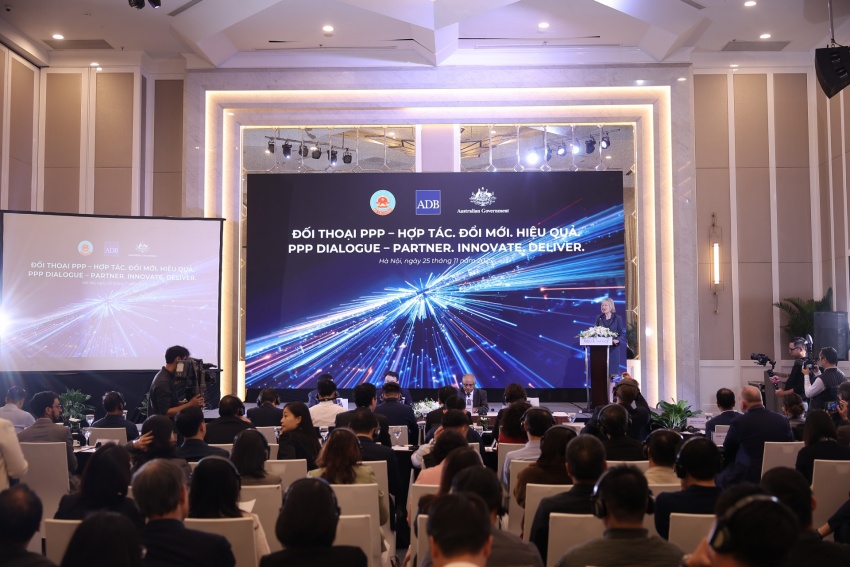At a high-level dialogue on public-private partnerships (PPPs) on November 25, government agencies, development partners, and the business community discussed Vietnam’s continued reforms in PPP policy and identified priority sectors for cooperation in the coming years.
 |
| Deputy Minister of Finance Tran Quoc Phuong |
Deputy Minister of Finance Tran Quoc Phuong emphasised that as Vietnam pursues rapid and sustainable growth and aims to strengthen its competitiveness, the demand for modern infrastructure is enormous, while public resources can only meet part of that need.
“Mobilising private-sector participation is indispensable,” he said, noting that the PPP policy framework has been continuously improved in recent years. Amendments to the Law on PPP and related decrees in 2024-2025 have expanded eligible sectors, increased flexibility in financial mechanisms and risk-sharing, and streamlined administrative procedures.
According to the deputy minister, after a long period of policy refinement, Vietnam is now ready to accelerate the implementation of high-impact projects, aligning with development priorities and evolving cooperation trends.
He noted three priority areas for cooperation. Transport, the backbone of PPP programmes, continues to be the sector with the largest capital needs and strongest investor interest from expressways, seaports and airports to inter-regional connectivity.
"PPPs help speed up the delivery of national priority projects, ensures reasonable risk allocation, and enhances operational efficiency in line with international standards, thereby creating strong spillover effects for economic growth," Deputy Minister Phuong explained.
In urban transit and transit-oriented development, major cities face growing demand for metro lines, public transport networks, and smart urban infrastructure. Such development is considered a promising model to mobilise private investment by leveraging land value capture and integrated urban development.
The third group covers innovation, digital transformation, and social infrastructure. Ventures in this group, including digital infrastructure, e-government services, and tripartite cooperation between the state, enterprises, and academic institutions, are expected to open new pathways for Vietnam’s digital economy.
 |
| Shantanu Chakraborty, ADB country director for Vietnam |
Shantanu Chakraborty, Asian Development Bank (ADB) country director for Vietnam, said that the landmark PPP Law of 2020 brought these aspects into a single, unified framework, and that recent revisions in 2024 and 2025 show the government’s ongoing commitment to improving the system and responding to real-world implementation experience.
"This progress reflects a long journey, and one that has laid the groundwork for Vietnam to scale up PPPs in a much more strategic and consistent way. However, a long way is still ahead to go until seeing a meaningful number of bankable projects reaching the markets for financing," Chakraborty said.
He also highlighted five key challenges Vietnam must address in order to build a pipeline of truly bankable projects: project preparation capacity still needs to improve substantially; risk allocation remains a significant concern for investors and lenders; long-term financing options needed for long-life infrastructure assets remain limited; competitive selection of private investors remains limited; and new and emerging sectors require updated policy tools and partnership models to fit their unique needs.
"These are not unusual challenges. Every country faces them when moving from policy design to real, large-scale implementation. With continued collaboration, Vietnam can overcome them and unlock significantly greater private investment in the years ahead," he added.
 |
Through the ADB technical assistance project and other programmes, ADB continues to work closely with ministries, line agencies, and developers. Its support ranges from policy reforms and capacity building to undertaking preparation and transaction advice in transport, digital services, innovation, and social infrastructure.
"The goal is simple: to help Vietnam build a strong, credible, and investment-ready pipeline of PPP schemes that can draw in high-quality private capital," Chakraborty said.
As Vietnam continues its development journey, PPPs will play an increasingly important role in delivering modern, resilient, and sustainable infrastructure, which he added requires leadership, strong institutions, well-prepared projects, and trusted partnerships.
"ADB remains fully committed to supporting Vietnam in building a robust, transparent, and innovation-driven PPP ecosystem," Chakraborty said.




















































